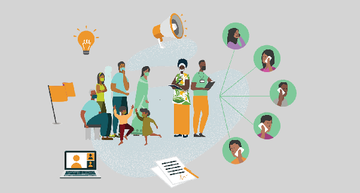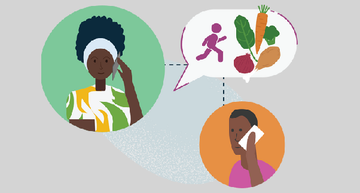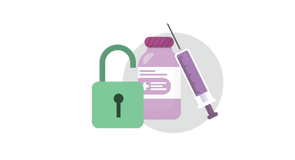Non-Communicable and Communicable Diseases
Non-communicable diseases (NCDs) are non-infectious health conditions that don't spread from person to person, for example heart disease, cancer and diabetes. Communicable diseases (CDs) are infectious conditions like HIV, STI's and TB that can spread from person to person. People with NCDs and CD require routine and specialized care, but due to COVID-19, they have not been able to access the care they need.
Some people have not received care because they fear leaving their home and being exposed to COVID-19. Others cannot access care due to limited public transportation, lack of available health workers and services or because of a shortage of medicines and other supplies in some areas.
Encourage community members to access regular healthcare services, while taking all the COVID-19 precautions of mask wearing, distancing and washing hands
Continuing Treatment and Care for People with NCDs and CDs

Know the health conditions in your community by asking them about any NCDs, communicable diseases or medications. Empower people with information to manage their conditions and make sure to advise them to be extra cautious of COVID-19 as they are at higher risk of severe illness. It is particularly important for them to get care when needed. Communicate remotely using social media, SMS, TV, radio or email or any other method that is available to you.

Encourage the community to continue to look after their health and adopt healthy eating and physical activity. The ideal diet is varied with lots of fruit and vegetables. Also advise people to reduce their salt and sugar intake and eat less processed and fast foods. Encourage exercise for physical health, too. Share ways to exercise in quarantine, like walking outside if it is safe and allowed.

Stress can worsen health conditions. Ask your patients about their stress and how they are coping. Encourage them to seek support from family and friends during this time. Share positive coping ideas like safely meeting with community organizations and churches that provide support, getting plenty of sleep and avoiding alcohol, tobacco and other harmful substances.

People must be encouraged to continue any treatment. Help them access delivery services where possible and explain these tips for accessing services safely:
- Always wear a mask;
- keep a distance of 6ft (2m) away from others;
- wash hands with soap and water or use sanitizer.
They can also limit their visits to collect medications by requesting supplies to cover them for longer periods if possible.

Refer them to health facilities if they have severe symptoms, especially COVID-19 symptoms. Explain what to expect at health facilities and follow up with them after discharge.
Average Rating: ☆ ☆ ☆ ☆ ☆ (0 reviews)


